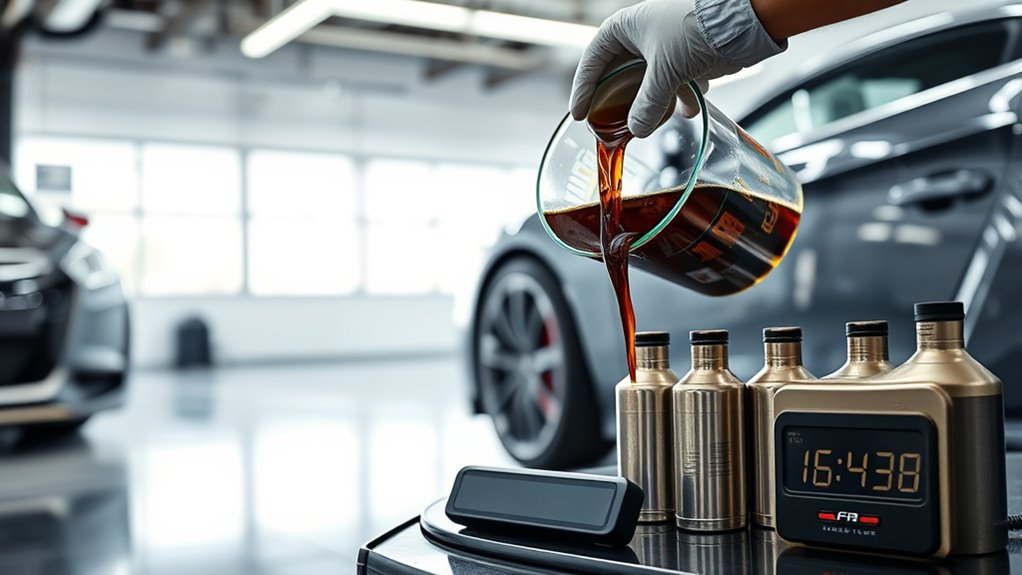Your oil change interval depends on factors like the type of oil you use—synthetic oils often last longer—your driving habits, and your vehicle’s manufacturer recommendations. Short trips, stop-and-go traffic, and extreme temperatures can shorten the oil’s lifespan. Don’t forget to replace the oil filter at every change, as it keeps contaminants out of your engine. To keep your engine running smoothly longer, consider these factors carefully; more details await you.
Key Takeaways
- Follow your vehicle manufacturer’s recommended intervals for oil and filter changes.
- Use synthetic oils for longer-lasting lubrication, which can extend oil change intervals.
- Consider driving habits and conditions, such as short trips or stop-and-go traffic, which can shorten oil life.
- Regularly check oil level and quality to identify when an oil change is needed earlier than scheduled.
- Replace the oil filter during every oil change to prevent contaminants from damaging the engine.

How often should you change your car’s oil? The answer depends on several factors, including the type of oil you use, your driving habits, and your vehicle’s manufacturer recommendations. In recent years, many drivers have shifted toward synthetic oils, which tend to last longer than conventional oils. Synthetic oils are engineered to resist breakdown, provide better lubrication, and handle higher temperatures, making them ideal for modern engines. If you’re using synthetic oil, you might find that your oil change intervals can extend to every 7,500 to 10,000 miles, or even more, depending on driving conditions. However, even with synthetic oils, you shouldn’t neglect regular maintenance and should always check your vehicle’s owner’s manual for specific guidance.
The oil filter plays a vital role in maintaining engine health during oil changes. It traps dirt, debris, and metal particles that accumulate over time, preventing these contaminants from circulating through your engine. When you change your oil, it’s essential to replace the oil filter too. A new filter ensures that your fresh synthetic oil remains clean longer, which helps your engine run smoothly and reduces wear over time. Neglecting to change the oil filter can cause contaminants to build up, even if you’re using high-quality synthetic oils, leading to potential engine damage and decreased performance.
Many drivers overlook the importance of the oil filter and assume that changing the oil alone is enough. This misconception can be costly, as a clogged or old filter can restrict oil flow, diminishing lubrication and increasing engine wear. When you schedule an oil change, make it a point to replace the oil filter, especially if you’re using synthetic oils that last longer but still need proper filtration. Some vehicles have a cartridge-style filter, making it easier to swap out during oil changes, while others might require a bit more effort, but it’s worth the investment for the longevity of your engine.
Replacing the oil filter is essential for engine health and optimal lubrication.
In addition to choosing the right oil and replacing the filter, pay attention to your driving conditions. Short trips, stop-and-go traffic, towing, or extreme temperatures can all influence how often you should change your oil. Regularly check your oil level and quality, and consult your vehicle’s manual for tailored advice. By sticking to the recommended intervals and ensuring you replace both synthetic oils and the oil filter when needed, you’ll keep your engine running efficiently and extend its lifespan. Proper maintenance isn’t just about following a schedule; it’s about understanding that these small steps make a big difference in the long run.
Frequently Asked Questions
How Do Extreme Weather Conditions Affect Oil Change Intervals?
Extreme weather conditions, like very hot or cold ambient temperatures, can shorten your oil change interval. High temperatures cause your engine oil to break down faster, while cold weather thickens the oil, making it less effective at lubrication. Climate variability means you may need to change your oil more often to protect your engine. Keep an eye on your vehicle’s performance and follow manufacturer recommendations for changing oil in extreme conditions.
Can Synthetic Oil Extend the Recommended Oil Change Timeline?
Think of synthetic oil as a marathon runner, built for endurance. It can indeed extend the recommended oil change intervals because it resists breakdown and keeps your engine cleaner longer. By choosing synthetic oil, you’re giving your engine a longer-lasting shield, reducing the need for frequent changes. Just remember to follow your vehicle manufacturer’s guidelines, but generally, synthetic oil helps you go further between oil changes with confidence.
Do Different Vehicle Models Require Varying Oil Change Frequencies?
Yes, different vehicle models require varying oil change frequencies based on vehicle-specific maintenance needs and manufacturer recommendations. You should always follow the guidelines provided in your owner’s manual, as factors like engine design, driving conditions, and oil type influence oil change intervals. Adhering to manufacturer recommendations guarantees ideal engine performance and longevity. If you often drive under severe conditions, consider more frequent oil changes, regardless of your vehicle model.
How Does Driving Style Impact Oil Degradation and Replacement Needs?
Driving style affects your oil’s lifespan like a marathon runner versus a sprinter. Aggressive driving habits, such as rapid acceleration and frequent braking, cause your oil to degrade faster, requiring more frequent replacements. Smooth driving extends oil life by reducing engine stress and contaminants. Monitoring your driving habits helps determine when to change your oil, ensuring your engine stays protected and runs efficiently longer.
Are There Signs Indicating an Immediate Need for an Oil Change?
If you notice increased engine noise or dark, dirty oil on the dipstick, these are signs you need an immediate oil change. Poor oil quality can cause your engine to run less smoothly, and unusual noises often indicate insufficient lubrication. Don’t ignore these signals; addressing them promptly helps protect your engine and keeps it running efficiently. Regularly checking your oil helps catch problems before they become costly.
Conclusion
Think of your engine like a garden; neglecting oil changes is like ignoring weeds—eventually, everything suffers. I once skipped an oil change and noticed my car’s performance plummet, much like a garden full of weeds choking out healthy plants. Regular oil changes keep your engine running smoothly, just like watering and weeding keeps a garden thriving. Don’t wait for trouble to bloom—stay proactive, and your vehicle will reward you with lasting performance.









